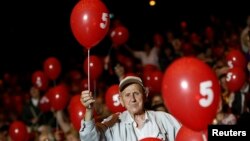SOFIA —
Bulgaria's two biggest parties look unlikely to win a majority in Sunday's election and neither looks capable of forming a coalition, prolonging a power vacuum in the EU's poorest member that would shake the economy and stir unrest.
Tens of thousands took to the streets in February to protest against corruption, rising unemployment and high utility bills in February, forcing Prime Minister Boiko Borisov and his GERB party to resign in favor of a caretaker government.
Demonstrations are planned for polling day.
GERB's commitment to tight fiscal policy, which supports confidence in a currency peg to the euro, would reassure investors but would enrage already volatile public sentiment.
Bulgaria lags the rest of the bloc that it joined in 2007 and its struggles show the risk of fraying democracy and vulnerable economies in fringe members as the euro zone focuses on its own financial crisis.
Business in Bulgaria also remains unhappy over deep-rooted graft that it says means many public tenders are fixed, and creates over extensive bureaucracy and unpredictable decision making.
“Both parties do not deliver on pre-election pledges and so do not follow their programs," said Bozhidar Danev, chairman of the top business organization BIA.
“Politicians are liars," he said.
No majority
Borisov has ruled out any coalition deal, but has previously worked with Attack, the main beneficiary of the protests with about five percent support, on an unofficial basis, although its anti-EU, Roma and Turkish rhetoric limits its appeal as a partner.
He also could try to bring onside the right-wing pro-business Bulgaria for the Citizens, led by former EU commissioner Meglena Kuneva, along with Attack to create an alliance with more than 120 seats in the 240 member parliament.
The Socialists, for their part, have promised to create 250,000 jobs, bring unemployment down from an eight-year high, and cut taxes for low earners as well as keeping debt low. They have failed to convince voters beyond their core support.
They previously have worked with a smaller party, the ethnic Turkish MRF, but the two together may still fall short of a majority and also may be vying for Kuneva's backing.
“After the elections we will meet with all parties that have entered the parliament, without GERB," Socialist leader Sergei Stains told newspaper Trud.
A poll on Thursday by the private Sova Harris agency put Borisov's center-right GERB at 20.9 percent and the Socialists on 20.4 percent, while pollsters Center of Analysis and Marketing put GERB at 21.3 percent and the Socialists at 18.9 percent.
At least 43 percent support is needed for a majority.
A previous Sova Harris poll, conducted in December, had GERB on 26 percent and the Socialists on 21 percent. The state funded NPOC last month put GERB at 23.6 and the Socialists at 17.7 percent. GERB's fortunes started to fade after a wire tapping scandal that has implicated one of its senior members.
“The results from the poll and the political realities suggest that a ruling coalition will have to be formed by at least three parties," said pollster Yuliy Pavlov, with the Center of Analysis and Marketing.
Tens of thousands took to the streets in February to protest against corruption, rising unemployment and high utility bills in February, forcing Prime Minister Boiko Borisov and his GERB party to resign in favor of a caretaker government.
Demonstrations are planned for polling day.
GERB's commitment to tight fiscal policy, which supports confidence in a currency peg to the euro, would reassure investors but would enrage already volatile public sentiment.
Bulgaria lags the rest of the bloc that it joined in 2007 and its struggles show the risk of fraying democracy and vulnerable economies in fringe members as the euro zone focuses on its own financial crisis.
Business in Bulgaria also remains unhappy over deep-rooted graft that it says means many public tenders are fixed, and creates over extensive bureaucracy and unpredictable decision making.
“Both parties do not deliver on pre-election pledges and so do not follow their programs," said Bozhidar Danev, chairman of the top business organization BIA.
“Politicians are liars," he said.
No majority
Borisov has ruled out any coalition deal, but has previously worked with Attack, the main beneficiary of the protests with about five percent support, on an unofficial basis, although its anti-EU, Roma and Turkish rhetoric limits its appeal as a partner.
He also could try to bring onside the right-wing pro-business Bulgaria for the Citizens, led by former EU commissioner Meglena Kuneva, along with Attack to create an alliance with more than 120 seats in the 240 member parliament.
The Socialists, for their part, have promised to create 250,000 jobs, bring unemployment down from an eight-year high, and cut taxes for low earners as well as keeping debt low. They have failed to convince voters beyond their core support.
They previously have worked with a smaller party, the ethnic Turkish MRF, but the two together may still fall short of a majority and also may be vying for Kuneva's backing.
“After the elections we will meet with all parties that have entered the parliament, without GERB," Socialist leader Sergei Stains told newspaper Trud.
A poll on Thursday by the private Sova Harris agency put Borisov's center-right GERB at 20.9 percent and the Socialists on 20.4 percent, while pollsters Center of Analysis and Marketing put GERB at 21.3 percent and the Socialists at 18.9 percent.
At least 43 percent support is needed for a majority.
A previous Sova Harris poll, conducted in December, had GERB on 26 percent and the Socialists on 21 percent. The state funded NPOC last month put GERB at 23.6 and the Socialists at 17.7 percent. GERB's fortunes started to fade after a wire tapping scandal that has implicated one of its senior members.
“The results from the poll and the political realities suggest that a ruling coalition will have to be formed by at least three parties," said pollster Yuliy Pavlov, with the Center of Analysis and Marketing.












